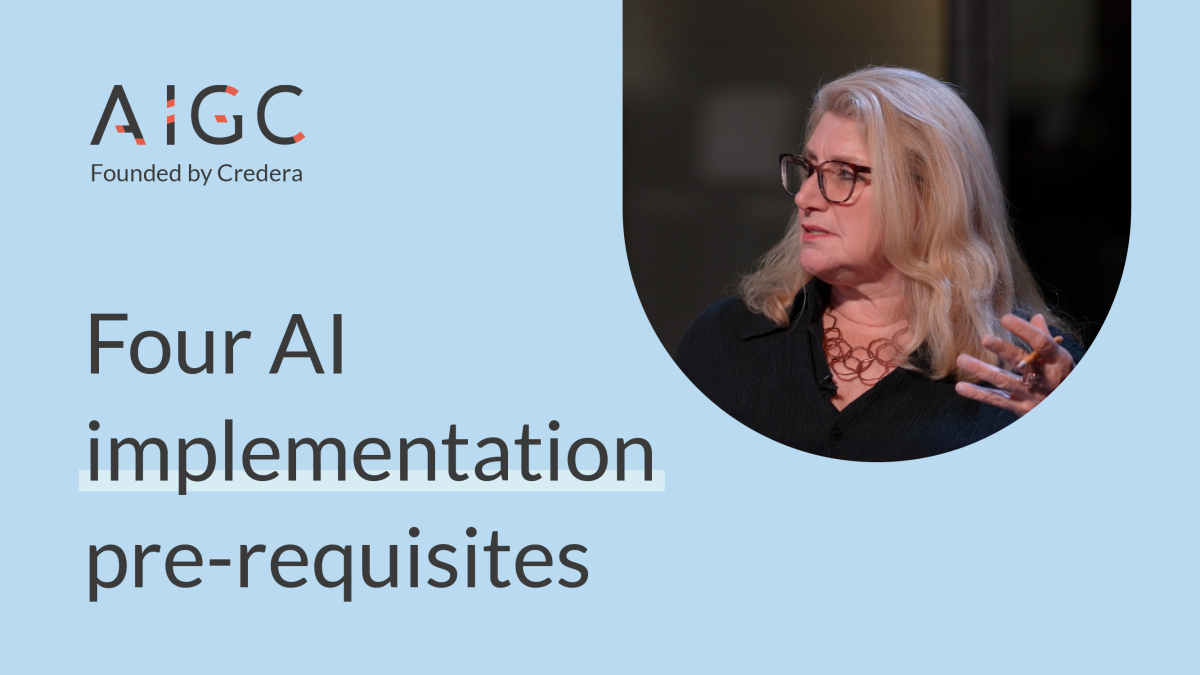AI
Nov 27, 2023
From the AI Global Council: Four steps to assess AI implementation pre-requisites

The AI Global Council is a consortium of thought leaders from multi-disciplinary backgrounds who have come together to address the opportunities and challenges posed by the rapidly changing world of artificial intelligence (AI).
In their first meeting, one conversation circled around the pre-requisites leaders should be aware of when migrating toward AI implementation. JoAnn Stonier, chief data officer at Mastercard, outlined practical considerations for leaders beginning their strategic planning for AI. While the theoretical approach to AI implementation may seem more exciting, Stonier points out that it may be more pragmatic for leaders to evaluate the use cases currently present in their organization, and from there, build toward the AI future they want.
Assessing areas of leverage
While AI presents leaders with a multitude of new arenas to operate in, the reality is that for many leaders, it is more advantageous to assess their current business operations and identify pre-existing use cases where AI can take root. From a high level, this means leaders must question if they plan to approach AI implementation from a primarily offensive or defensive lens: Will they take this moment to focus on growing their business or is this an opportunity to focus on improving operational effectiveness and efficiencies?
At another level, Stonier breaks down four main steps leaders can follow to assess if areas of leverage exist in their organizations, which can then guide their approach toward AI.
Step 1: Embracing the scoping moment
The first step consists of the “scoping moment,” the period leaders should dedicate to deciding whether they will go down an offensive or defensive route with AI. Essential to this step is team formation: What combination of people and skills, such as business strategists and data scientists, will be needed to identify areas in the organization where AI can grow from and help steer the organization down the chosen route?
Step 2: Analyze data assets
Data is a necessary component of any AI discussion, and Stonier explains that for the second step, leaders must explore where their data assets will be sourced from, be it internally or from third parties. Other components of this step include thinking through data quality and expertise and organizing this information into data sets curated for AI utilization. Once this information is finalized, the process flows into the third step.
Step 3: Outline modeling and engineering team design
In the third step, organizations must outline what their modeling and engineering teams will look like and conduct technology assessments to review the maturity of the resources that will underpin this entire implementation.
Step 4: Focus on measurement
The fourth step focuses on measurements, which requires the creation of metrics and the allocation of team members who will take the lead on evaluating the outputs and outcomes of AI implementation in the use case chosen in step one.
Putting it all together
Outside of these four steps, but still key to the process, are support teams that consist of skills spanning risk management, legal, privacy and security, vendor management, and more, all of which will need to be either outsourced or located in-house. To be properly equipped to bring in AI, organizations will need to ensure these pre-requisites are accounted for and customized to the organizations’ specific needs.
AI in organizations
Leaders are faced with a multitude of choices when determining where AI fits into their organizational needs and how it can best solve their greatest challenges. The four steps that Stonier outlines provide a practical starting point for leaders who are looking to leverage use cases in their organizations to begin AI implementation.
The Global AI Council delves into three other perspectives regarding the pressing questions executives should ask when they are preparing to onboard AI into their organization.
Watch the full video here.
Explore more about the AI Global Council
The AI Global Council serves as a forum composed of experts, policymakers, academics, and industry leaders who engage in pressing conversations about the amorphous reality of AI, and how it is shaping the world. For more information about the Council, and to stay connected to their work, follow along on LinkedIn or reach out at findoutmore@credera.com.
Contact Us
Ready to achieve your vision? We're here to help.
We'd love to start a conversation. Fill out the form and we'll connect you with the right person.
Searching for a new career?
View job openings

